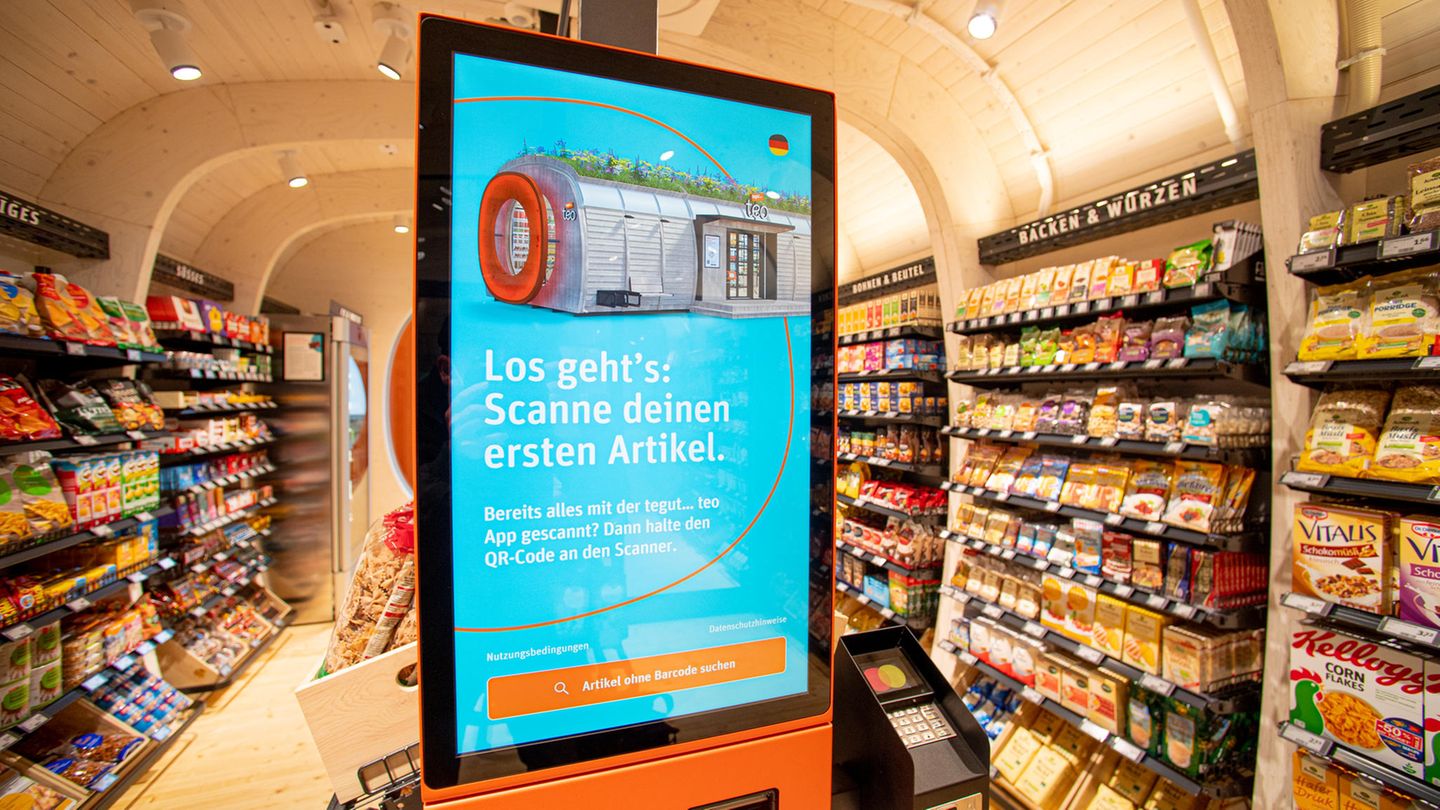Retailers have faced stiff competition in recent years: online supermarkets deliver to your doorstep and get by without closing times. Many large retail chains are therefore looking for ways to make shopping in stores fit for the future.
A rolling kiosk without a driver, a shop open around the clock without a salesperson, a supermarket without a cash register: the future has already begun in German retail. In more and more places in Germany, large retail chains such as Edeka, Rewe or Tegut are currently testing new ways of making their stores fit for the future in view of the booming online trade.
If you want snacks, you just have to wave
Take Cologne, for example: In the cathedral city, Rewe and Vodafone have been testing what they say is “Europe’s first self-driving kiosk” since Wednesday. Without a driver or salesperson, the snack mobile on the Carlswerk industrial campus in Cologne is intended to provide passers-by and office workers with snacks, sweets and drinks if required. Anyone who is hungry or thirsty only needs to wave and the rolling kiosk interrupts its loop through the area so that the customer can shop. Payment is made contactless – for example with a smartphone.
For safety reasons, the snack mobile is initially accompanied by a human supervisor. Nevertheless, Vodafone Germany boss Hannes Ametreiter was convinced of the future potential: “We are bringing autonomous vehicles from the test site into real life.”
Check in, shop, go out
The Snackmobil is by no means the only attempt to catapult the food trade in Germany into the digital era. Almost all major German retail chains are now looking for concepts for the supermarket of the future. Rewe is already testing shopping without a cash register in a smaller branch on Zeppelinstrasse in Cologne under the name “Pick & Go”. When entering the store, customers have to check in via the app, then simply pack the items they want and leave. Cameras, sensors and computers do the rest. You independently register what is packed, create the invoice and debit the money.
However, the system is not yet activated for everyone. Tests with selected employees are still running until September to eradicate teething problems. The special thing about the Rewe concept: Unlike similar Amazon stores, you can also shop normally in the branch, including payment at the checkout.
Packed by the gripper robot
Germany’s largest grocery retailer Edeka is testing a highly automated tiny store at the train station in Renningen, Baden-Württemberg, which works without sales staff and is open around the clock. The products ordered via app or on touchscreens in the tiny shop are put together by gripping robots in two container-sized storage units behind the sales area and transported to a pick-up counter where the customer receives them.
Up to 800 different products can be offered in this way. “A snack for the way to work or the spontaneous weekly shopping, everything is possible and completely independent of the time”, praised the Edeka clerk and owner of the mini-shop Gisela Karow-Schäfer the concept at the opening. Payment is made by card or online using an app.
Supermarkets now have first names
The Tegut retail chain in the Fulda area already has three mini markets without sales staff in operation. Here, too, the customer must first install an app with which he can open the door of the shop called Teo. In the store, he can then take the goods off the shelf himself and scan them. Payment is cashless by card or app. Tegut believes that a Teo branch can also be successful where classic sales concepts such as supermarkets do not make economic sense – for example in new building areas, in front of clinics and universities, at transport hubs or on company premises.
The Schwarz Group, one of the largest retailers in Europe with its Lidl and Kaufland chains, has also started its first tests with high-tech shops in Heilbronn. A rollout of the concepts at Kaufland or Lidl is not planned, the company dampens expectations.
Time for a makeover
There are good reasons for the retail giants’ willingness to experiment. Because a good 60 years after the triumphant advance of the self-service supermarket began in Germany, it seems high time that the retail sector reinvented itself once again. After all, the competition is just a click away. The online trade in groceries received a powerful boost in the corona pandemic and almost doubled its sales. And more and more new competitors such as Gorillas, Flink or Knuspr are pushing their way into the rapidly growing market.
The advantages of online supermarkets are obvious: They are open 24 hours a day – and those who shop there do not have to stand in line at the checkout. The traditional shops have some catching up to do here, as the current study “Future of Check-out” by the Cologne retail research institute EHI and the Volksbank Raiffeisenbank subsidiary VR Payment shows.
Especially the queues at the cash registers are therefore a thorn in the side of the customer. “Customers want to shop, not pay. They perceive queuing at the checkout primarily as a waste of time and a burden,” says the study, based on a representative survey of 1,000 consumers. Around half of customers are therefore of the opinion that the supermarket of the future will no longer have cash registers and should be open around the clock.

You can see in the video: In the test, cherries from the discounter, from the supermarket and from the fruit stall are compared – price, origin and taste. There is a very clear winner.
Jane Stock is a technology author, who has written for 24 Hours World. She writes about the latest in technology news and trends, and is always on the lookout for new and innovative ways to improve his audience’s experience.




